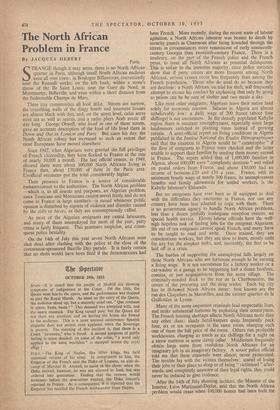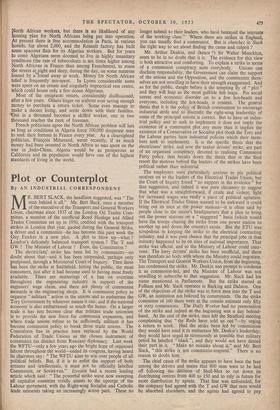The North African Problem in France
By JACQUES HEBERT Paris.
STRANGE though it may seem, there is no North African quarter in Paris, although small North African enclaves exist all over town : in Boulogne Billancourt, conveniently near the Renault works; on the left bank, within a stone's throw of the Ile Saint Louis; near the Gare du Nord, in Montmartre, Belleville, and even within a short distance from the fashionable Champs de Mars. .
These tiny communities all look alike. Streets are narrow, the crumbling walls of the dingy hotels and tenement houses are almost black with dirt, and, on the street level, cafés serve mint tea as well as spirits, and a radio plays Arab music all day long. George Orwell, who lived in one of these streets, gave an accurate description of the kind of life lived there in Down and Out in London and Paris. But since his day, the North African colony has increased to such an extent that most Europeans have moved elsewhere.' • Since 1947, when Algerians were granted the full privileges of french citizenship, they have flocked to France at the rate of nearly 10,000 a month. The last official census, in 1949, showed there were about 300,000 North Africans living in France then, about 130,000 of them in the Paris area. Unofficial estimates put the total considerably higher.
Their presence in France is a source of considerable embarrassment to the authorities. The North African problem —which is, to all intents and purposes, an Algerian problem, since Tunisians and Moroccans cannot travel freely and do not come to France in large numbers—is raised whenever public opinion is disturbed by reports of violence and disorder caused by the sidis or bicots, as they are contemptuously called. _ As most of the Algerian emigrants are casual labourers, and many of them unemployed for most of the year, petty crime is fairly frequent. This generates suspicion, and conse- quent police brutality.
On the 14th of July this year seven North Africans were shot dead after clashing with the police at the close of the communist-sponsored Bastille Day parade. It is fairly certain that no shots would have been fired if the demonstrators had been French. More recently, during the recent wave of labour agitation, a North African labourer was beaten to death by security guards in Chaumont after being hounded through the streets in circumstances more reminiscent of early nineteenth- century Georgia than twentieth-century France. There is a tendency, on the part of the French police and the French press, to treat all North Africans as potential delinquents. This is unfair to the immense majority, since police statistics show that if petty crimes are more frequent among North Africans, serious crimes occur less frequently than among the French population. Those who do steal do so because they are destitute: a North African, on trial for theft, will frequently attempt to excuse his conduct by explaining that only by going to prison can he be sure of shelter and two meals a day.
Like most other emigrants, Algerians leave their native land solely for economic reasons. Salaries in Algeria are almost unbelievably low: a daily wage of 200 francs (about four shillings) is not uncommon. In the densely populated Kabylie region there is constant unemployment, especially since large landowners switched to planting vines instead of growing cereals. A semi-official report on living conditions in Algeria published in the Institut National des Etudes Demograplziques said that the situation in Algeria would be " catastrophic " if the flow of emigrants to France were checked and the latter unable to support their families by sending them money earned in France. The report added that of 1,600,000 families in Algeria, about 600,000 were " completely destitute " and relied on postal orders from France, and about 150,000 had an income of between-,£20 and £50 a year. France, with its minimum hourly wage of nearly 100 francs, its unemployment benefits and family allowances for settled workers, is the Kabylie labourer's Eldorado.
But no emigrants have ever been so ill equipped to deal with the difficulties they encounter in France, nor can any country have been less adapted to cope with them. There is no government agency to handle North African problems, less than a dozen pitifully inadequate reception centres, no special health service. Eleven labour officials have the well- nigh hopeless task of finding jobs for the emigrant Algerians. Six out of ten emigrants cannot speak French, and many have to be taught to read and write. Once trained, they are conscientious workers, but they are slow to learn, mostly unfit for any but the simplest tasks, and, inevitably, the first to be laid off in a crisis.
The burden of supporting the unemployed falls largely on those North Africans who are fortunate enough to be earning a living wage. It is not uncommon for a factory worker or a car-washer in a garage to be supporting half a dozen brothers, cousins, or just acquaintances from the same village. The criminally-minded flock to the rue de la Charbonniere, the centre of the procuring and the drug trades. Each big city has its ill-famed North African street: best known are the rue des Chapeliers in Marseilles, and the sinister quartier de la Guillotiere in Lyons.
Many of the more important criminals lead respectable lives, and make substantial fortunes by exploiting their countrymen. The French housing shortage affects North Africans more than any other class: shady hotel-keepers quite frequently pack four, six or ten occupants in the same room, charging each one of them the full price of the room. Others run profitable workhouses, charging as much as six shillings for a night on a straw mattress in some damp cellar. Middlemen frequently obtain large sums from credulous. North Africans for an imaginary job in an imaginary factory. A senior police official told me that these criminals were almost never prosecuted. The trouble lay with the victims themselves: scared of losing their jobs or their place to sleep or of being " victimised " after- wards, and completely unaware of their legal rights, they could never be induced to give evidence.
After the 14th of July shooting incident, the Minister of the Interior, Leon Martinaud-Deplat, said that the North African problem would cease when 100,000 homes had been built for l■Torth African workers, but there is no likelihood of any housing plan for North Africans being put into operation. At present there is free accommodation in Paris, in various hostels, kit about 2,000, and the Renault factory has built some spacious flats for its Algerian workers. But for years to come Algerians seem doomed to live in highly insanitary conditions (the rate of tuberculosis is ten times higher among North Africans in France than among Frenchmen), to roam the streets a1pight and sleep, during the day, on some mattress loaned by a friend away at work. Money for North African relief is frequently mis-spent. In Lyons considerable sums were spent on an ornate and singularly unpractical rest centre, which could house only a few dozen Algerians.
Most of the emigrants return, considerably disillusioned, after a few years. Others linger on without ever saving enough money to purchase a return ticket. Some even manage to Make a decent living, and settle down with their families. 'One in a thousand becomes a skilled worker, one in two thousand reaches the rank of foreman.
French politicians agree the North African problem will last as long as conditions in Algeria force 100,000 desperate men to seek their fortune in France every year. As a clearsighted politician, Francois Mitterand, wrote recently, if as much money had been invested in North Africa as was spent on the war in ,Indo-China, Algeria would be as prosperous as California and its population would have one of the highest standards of living in the world.



































 Previous page
Previous page